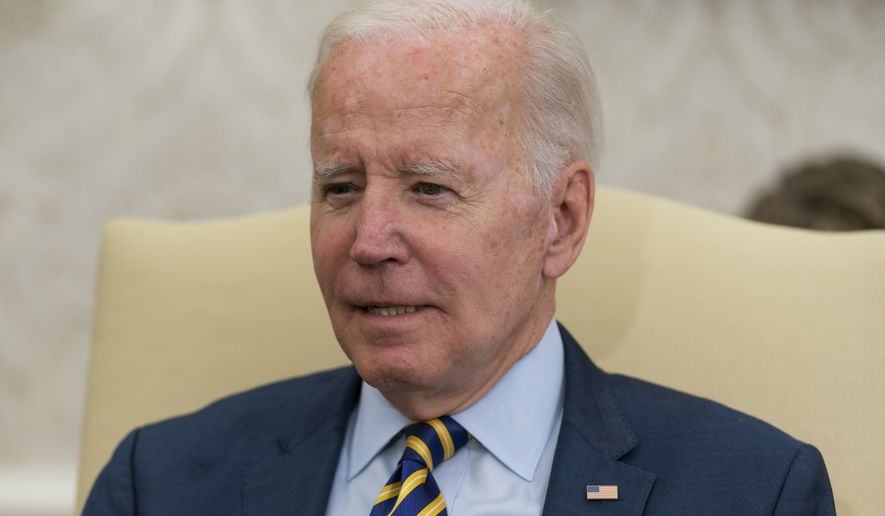President Biden has barely mentioned his massive student loan forgiveness plan in speeches to friendly, Democratic audiences, sidestepping the issue as the midterm election season heats up.
Following Mr. Biden’s Aug. 24 announcement canceling up to $20,000 in student loans for individuals making less than $125,000, he’s delivered 13 public remarks, including six speeches focused on his legislative accomplishments.
Yet Mr. Biden only mentioned his student debt relief plan only once. In an address Thursday to the 45th Congressional Hispanic Caucus Institute Gala, the president briefly brought it up, saying that nearly half of the Hispanic students with federal loans will see their debt totally forgiven.
“It gives people a chance,” Mr. Biden said of the plan before he quickly pivoted to his support for protecting “Dreamers” from deportation. “Dreamers” are immigrants who were brought illegally to the U.S. as children.
Instead of focusing on fulfilling a 2020 campaign promise on student debt, Mr. Biden has centered his midterm message on his legislative wins, depicted supporters of former President Donald Trump as threats to democracy, and pledged to protect abortion rights. He’s touted his massive climate, tax, and health care law; a measure that will boost computer chip manufacturing; and a law revamping the country’s infrastructure.
In three speeches — including two on the day after his student debt announcement — at Democratic National Committee events, Mr. Biden notably did not include debt relief among his accomplishments.
This week, Mr. Biden delivered remarks at a DNC fundraiser in Boston and, separately, addressed autoworkers in Detroit. In both addresses, he ticked off a list of accomplishments, but his student debt plan was absent.
The White House did not respond to a request for comment.
Republicans say Mr. Biden is shying away from the debt relief plan because it has fallen flat with voters. The plan has raised complaints about fundamental unfairness, and requiring taxpayers to pay off the loans.
“Bailing out the wealthy is not only unpopular but wildly out of touch with the struggles that families are facing today. Only Biden would believe hardworking Americans would welcome this unfair bailout — but that happens when you are a career politician beholden to the most radical elements of the Democratic Party,” said Will O’Grady, a spokesperson for the Republican National Committee.
A Morning Consult/Politico poll released Aug. 31 found that 47% of independent voters do not support Mr. Biden’s plan, compared to 42% who approved it. Along party lines, 67% of Republicans and 19% of Democrats opposed the action.
And some Democrats, including Sen. Catherine Cortez Masto of Nevada, have distanced themselves from the plan.
In a statement, Ms. Cortez Masto said she didn’t agree with Mr. Biden’s action, saying the government should focus on making college more affordable instead of forgiving student loans.
Democrats say the president is touting his massive spending law, dubbed the Inflation Reduction Act, and other wins because they affect a larger swath of voters than student loan forgiveness.
Student loan debt relief is tailored toward a narrow subset of younger, college-educated voters.
“He’s not talking about it because it doesn’t have the overall impact on policy and politics,” said Brad Bannon, a Democratic strategist. “The Inflation Reduction Act is popular, especially the Medicare prescription drug provisions, and has more impact on voters than student loan forgiveness.”
• Jeff Mordock can be reached at jmordock@washingtontimes.com.




Please read our comment policy before commenting.